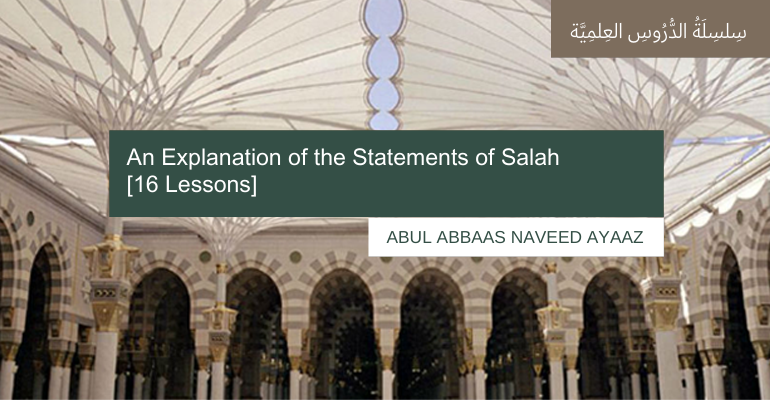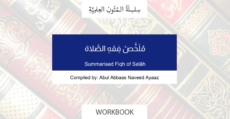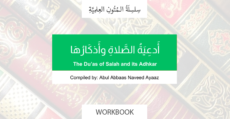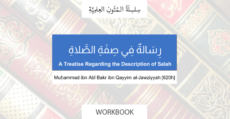A series of short lessons explaining the statements of Salah. These lessons will cover important definitions as well as the various adhkar and du’as which are said during different positions in Salah, from Takbir to Taslim as well as du’a al-Qunut.
Each du’a & dhikr is read in Arabic & translated, and then rulings and wisdoms are explained.
You can study the lessons by using the following workbook: Download Arabic/English Workbook
Lesson 1: Download Lesson 1
In this lesson you will learn:
- The importance and benefits of Salah.
- How to memorise.
- Types of ikhtilaf (difference in rulings).
- The linguistic and Islamic definition of Salah.
Lesson 2: Download Lesson 2
In this lesson you will learn:
- The linguistic and Islamic definition of niyyah;
- Why the niyyah is required;
- The linguistic and Islamic definition of du’a;
- Its virtues, conditions, etiquettes, manners, & how it is done.
- The different types of Du’aa
Lesson 3: Download Lesson 3
In this lesson, you will learn:
- The meaning and types of Khushu’;
- How to attain Khushu’ in Salah;
- The meaning of Takbeer; and it different types.
- Can a person begin Salah by using a different wording for Takbeer;
- What does a person do if one forgets to say takbeer or has a doubt regarding it?
Lesson 4: Download Lesson 4
In this lesson, you will learn:
- The ruling of du’a al-Istiftaah.
- When it is said and what a person does if he misses it out.
- An explanation of various different supplications a person can make at the beginning of Salaah.
Lesson 5:Download Lesson 5
In this lesson, you will learn:
- An explanation of further variations of du’a al-Istiftaah.
[Audio quality is poor]
Lesson 6: Download Lesson 6
In this lesson, you will learn:
- An explanation of al-Isti’aadhah;
- Its different variations
- The meaning of “Shaytan” and “rajeem”;
- An explanation of Bismillah.
Lesson 7: Download Lesson 7
In this lesson, you will learn:
- Rulings pertaining to Surah Al-Faatihah;
- The Ruling of saying Aameen.
- Reciting a Soorah whilst standing in salah.
- Tafseer of Surah al-Fatihah.
Lesson 8: Download Lesson 8
In this lesson, you will learn:
- Different types of tasbeehaat in the Rukoo;
Lesson 9: Download Lesson 9
In this lesson, you will learn:
- What to say when standing up from Rukoo’.
Lesson 10: Download Lesson 10
In this lesson, you will learn:
- Further statements of tahmeed after standing up from Rukoo;
- Different levels of ‘Uboodiyyah;
- The relationship between Tawheed At-Ruboobiyyah and Tawheed Al-Uloohiyyah;
- Why nobody enters Jannah on the mere basis of knowledge
Lesson 11: Download Lesson 11
In this lesson, you will learn:
- Rules pertaining to sujud – what does a person do if he misses the sujud?
- Can a person make a du’a for worldly-related matters in sujud?
- Can a person make du’a in a language other than Arabic in sujud?
- What is the meaning of Tasbeeh?
- What is the meaning of “subhana rabbi al-A’laa”, and why do we say it?
Lesson 12: Download Lesson 12
In this lesson, you will learn:
- The meaning of “maghfirah”;
- The different du’as for sujud which have been narrated;
- The meaning of tawheed ar-ruboobiyyah;
- What Iman in Allah constitutes.
Lesson 13: Download Lesson 13
In this lesson, you will learn:
- An explanation of the du’a which is said in the sitting between the two sujud;
- Ruling pertaining to the tashahhud;
- The meaning of “at-tahiyyaatu lillaah…”;
- Evidence that the Prophet (sal Allaahu alayhi wa sallam) indeed died and is not living a worldly life.
Lesson 14: Download Lesson 14
In this lesson, you will learn:
- An explanation “as-Salah al-Ibrahimiyyah” and its different variations;
- The impermissibility of adding any word to it such as “Sayyidina”;
- There is no place upon which the earth rises and sets except that the name of the Prophet is mentioned.
Lesson 15: Download Lesson 15
In this lesson, you will learn:
- An explanation of some of the du’as which are said before Tasleem.
- A discussion about making Du’a after salah.
- The meaning of fitnah and a reminder that Allah tests us with luxuries and comforts just as he tests others with poverty and difficulty.
Lesson 16 [Final Lesson]: Download Lesson 16
In this lesson, you will learn:
- Rulings pertaining to tasleem;
- An explanation of the Witr Prayer and du’a al-qunoot in it;
- How many raka’at should be prayed;
- How the Prophet (sal Allahu alayhi wa sallam) pray Witr;
- The difference between du’a al-qunoot and du’a an-nazilah;
- Should a person wipe the face after the du’a;
- How often should a person make du’a al-qunoot.







Assalaam alaykum warahmotullaah wabaarakatuh
Walaykum salaam wa rahmatullahi wa barakaatuh
Assalamu Alaykum such really beneficial series very little people go through something like this something which every average muslim needs to go through to understand what they saying in salaah in a simplistic way.
Before people start Arabic classes these kind of workshops need to be given more priority
Walaykum salaam wa rahmatullah,
May Allah bless you, the topic is indeed beneficial for every Muslims, it is important we learn, understand and alternate between the various Adhkaar and Duaas which the Prophet (sal Allaahu alayhi wa sallam) would say during Salaah.
وبالله التوفيق
Am making notes on these recordings inshallah when done I’ll send them via the website email address
I plan to teach this topic locally and to my private Quran Students this series is a very good aid gives me an idea how to delivery such workshops.
Ustaadh I strongly feel you should do a series like this to Al-Asmaa Al-Husnaa this never gets properly discussed in the west there lot of stuff on PRinciples of Asmaa Was-Sifaat but Al-Asmaa Al-Husna in terms of its lexical connotations as a worskshop is something needs to be done and since the source of Sifaat comes from Asmaa Husna since every Ism carries with it a Sifah
Walaykum salaam wa rahmatullahi wa barakaatuh
May Allah reward you for your efforts in trying to benefit your community. Once you have made notes, if you send then to us via admin@madeenah.com I will revise and edit them and make additions. The notes can then be made available as an online resource for people to benefit from.
With regards to the suggested series, it’s something which is planned soon inshaAllah – may Allah give us Tawfeeq.
JazakaAllah khayr
وبالله التوفيق
Assalamualaikum warahamthullahi wabarakathuhu
such a beautiful series ! a must one for every muslim because prayer is the most importantof all…
jazaakallah khairan for this..
wanted to know if class notes of this series is available? Im currently working on making notes of this series and Im on half way so that it would be more beneficial to people..i wish many people benefit from this study including myself ….if the notes are already there …. I can directly form a group and start a study group in sha allah….for its taking a very huge time typing it and making the notes !
Walaykum salaam
May Allah bless you for your kind words, you are right that such lessons are important and relevant to every Muslim. Unfortunately many of us only know the Adhkar/Duas which we learnt as children without understanding the meanings, wisdoms or other Adhkar variations.
Asides from the workbook, there are no notes available in English unfortunately, however if you do make the notes and send them to us via admin@madeenah.com I will look over them, edit and make additions. The revised notes can then be made available as an online resource.
May Allah reward you for your efforts.
وبالله التوفيق
Assalamualaikumm Usthad
some of the notes are ready
can i send it to you and can u correct it ?? so that we can start the study groups soon bithinillah
Walaykum salaam,
Yes sure, if you please send it to admin@madeenah.com
I will check and edit them.
May Allah place your efforts in your scales of goodness of the Day of Resurrection.
Abul Abbaas
Assalamualaikumm usthaad
I’ve sent the lessons
can u please confirm if you have recieved it ??
JazakaAllah khairan
And kindly inform us where we can get the corrected lessons
hoping to get it sooner in sha Allah
Walaykum salaam,
May Allah reward you greatly for your efforts. I have received the transcribed lessons from yourself as well as some of the other students who attend the lesson. Time permitting, I will edit and revise them – they still require a lot of work.
Wa billahi at-Tawfeeq.
Assalamualaikumm usthad regarding a point you said during isthaiadah wasn’t to curse anyone .
So some one asked there is scholarly differences regarding it
I’ve only proof for not to curse anyone
but there are other two opinions too
to curse a a kaafir and allowed to curse anyone.
What are the explanation for this ??
Walaykum salaam,
Scholars, old and contemporary, throughout the various Madhaahib have differed over many issues. Some difference in view is accepted due to the strength of evidence, whereas in many other issues the evidence is very weak and so the differing views are not considered. In any case, it is upon us to follow what is correct according to the evidences which are presented – not mere scholarly difference.
Wa billahi at-Tawfeeq
In rukoo
we have to say subhana rabiial adheem 3 times
and what about other duas we have learnt ?
Should we say either of duas or say any duas but also recite subhana rabial adheem??
Have this doubt becuase you said sunnah is to say one dua in the beginning ??
The Tasbeeh of the Rukoo’ is Waajib (an obligatory statement which cannot be left out intentionally). The absolute minimum Wajib is to say it once, however it is better to say it 3 times at a minimum, and then increase for extra reward.
Duas are not said in the Rukoo’, this is for the Sujood only, but there are other forms of Tasbeeh which can be said in place of or in addition to Subhana rabbee al-‘Adheem.
As for some of the Adhkar which have been narrated for the Rukoo’, they can be said after saying the Tasbeeh. The Tasbeeh is Wajib, whereas the other Adhkar are Mustahabb/Sunnah (recommended).
Allah knows best, wa billaahi Tawfeeq.
Assalamualaikumm Usthad
Resending my question again for more clarity in the question.
You mentioned that saying subhana rabial azheem once is waajib
So what about the other duas ??
Should we say other duas as extra with Subhana rabial azheeem or we can say any other duas without Subhana rabial azheem?
Have this doubt bcoz u said sunnah of prophet is to say only one dua at a time and to say different duas at different times
So if saying any other dua other than Subhana rabial azheem is enough or we should say both duas at once
Hope I’m clear
Walaykum salaam,
The other Adhkar which have been narrated regarding the Rukoo’ are said after saying the subhana rabbee al-‘Adheem at least once. The Tasbeeh must be said first, and then followed by the other Adhkar for extra reward.
As for Dua al-Istiftaah which is said after the Takbeer, it is better not to combine between them in a single Salah, rather only one is said at a time.
Allah knows best, wa billaahi at-Tawfeeq.